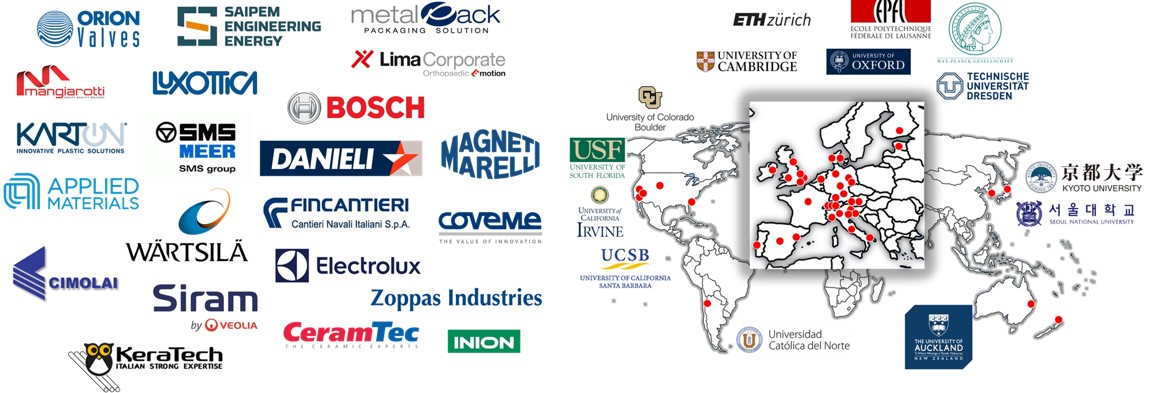"Peope will create the jobs of the future, not simply train for them..."
J. Grudin, Microsoft
Advanced materials and advanced processes are recognized by the European Union among the key enabling technologies for innovation. It is not surprising, then, that graduates in materials and chemical engineering are much appreciated in all job markets: the figure above is just a partial glimpse of the companies, research centers and universities where our graduates ended up working, fostering our broad network of collaborations.
However, the most natural career for graduates in our Master Degree is that of "Materials and Chemical Engineer". The typical skills and functions include the selection and design of processes and of materials (more details can be found here). While Chemical Engineers and Materials Engineers are traditionally characterized by distinct skills, our program aims at fostering the strong interconnectedness and synergy between the two, creating a more modern, versatile engineer.
So, also thanks to the particularly solid understanding of the fundamentals, especially in physics and chemistry, our engineers are particularly flexible, able to manage complex scenarios and to make decisions under non-standard conditions. This is particularly important in the highly interdisciplinary, fast-moving and innovation-prone areas such as the modern 4.0 and 5.0 industry, the nano- and biotechnologies, or the transition to a sustainable energy and industrial system - which our students have the chance to learn about more in depth.
Most importantly, the flexibility, versatility and adaptability to non-standard conditions prepares our graduates to the many, yet to be discovered, jobs of the future.
Careers
Early in their careers our graduates often work as designer and/or researcher in technical design offices, failure analysis, research and development laboratories (both public and private) in the industry of electronics, food, energy, pharmaceutical, in all kinds of manufacturing and all kinds of chemical plants.
At a later stage of the career, after having acquired the necessary experience, our graduates often become managers. A certain number of our graduates have undertaken the academic career.
Graduates in materials and chemical engineering typically earn a higher-than-average salary right from the start, on their first job. In their mid-career (see figure) they reach the highest overall average salary among all graduates.
Course Description -- Study Plan -- Admission -- Admission Requirements
Detailed skills of Materials Engineers and Chemical Engineers
The skills of the Chemical and Materials Engineer are associated with the ability to engineer industrial products and processes, and with the capability to understand the complex relationship between synthesis and manufacturing processes, the consequent structure of materials from the atomic-molecular to the macroscale, and the final properties of the materials and products themselves. Particularly strong are the skills in the field of nanotechnologies and biotechnologies, as well as in technologies for sustainability (for example life cycle analysis, or the design of materials and processes with sustainability criteria or for sustainable technologies).
These skills harmoniously blend with those traditionally possessed by Materials Engineers and Chemical Engineers:
The skills of the Materials Engineer are mainly associated with both scientific and technological knowledge of the most diverse materials: metals and metal alloys; other inorganic materials such as glasses, semiconductors and ceramic materials; natural and synthetic polymers; biological tissues. The Materials Engineer is able to study and understand the micro-nano-scopic properties of materials, and to relate them to their macroscopic behavior and functional and structural engineering properties. From this knowledge a specific competence emerges in the systematic and optimal selection of materials for specific applications, as well as the ability to design innovative materials required by specific applications – in line with the concept that advanced materials work as Key Enabling Technologies in European and global development strategies.
The skills of a Chemical Engineer can essentially be divided into two broad categories: Process and Principles. In the first case, the skills acquired are used for the optimization and control of already existing chemical plants or for the design of new plants. The various plants include the classic petrochemical plants, those relating to fine chemicals and all that vast range of plants dedicated to energy recovery and the treatment of polluted fluids and soils. In the second case, however, the skills acquired are used to study and model various physical phenomena (such as, for example heat, mass and energy transport) which can play a very important role in various technological and research devices such as, for example , biotechnological systems, pharmaceutical systems for the controlled release of drugs. In other words, the “Principles” chemical engineer devotes himself to the physical principles underlying the operation of many equipment / devices. Therefore, in general, the Chemical Process Engineer has a more “practical” cut while the “Principle” chemical engineer has a greater theoretical vocation.



